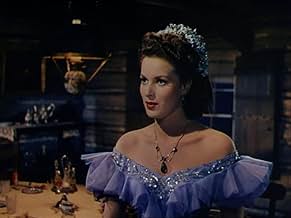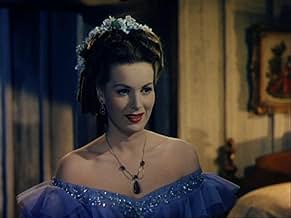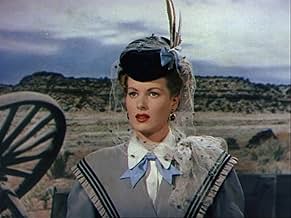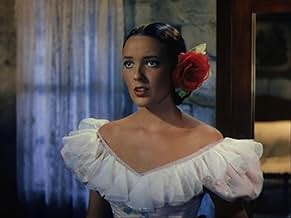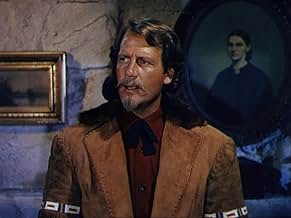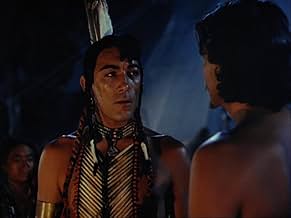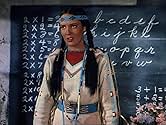AVALIAÇÃO DA IMDb
6,4/10
1,8 mil
SUA AVALIAÇÃO
Adicionar um enredo no seu idiomaThe story of William "Buffalo Bill" Cody, legendary westerner, from his days as an army scout to his later activities as owner of a Wild West show.The story of William "Buffalo Bill" Cody, legendary westerner, from his days as an army scout to his later activities as owner of a Wild West show.The story of William "Buffalo Bill" Cody, legendary westerner, from his days as an army scout to his later activities as owner of a Wild West show.
- Direção
- Roteiristas
- Artistas
- Prêmios
- 2 vitórias no total
Carl Andre
- Trooper
- (não creditado)
Arthur Aylesworth
- Pool Player Debunking Cody
- (não creditado)
Evelyn Beresford
- Queen Victoria
- (não creditado)
Edward Biby
- Sergeant
- (não creditado)
Sidney Blackmer
- Theodore Roosevelt
- (não creditado)
Billy Bletcher
- Short Man
- (não creditado)
William A. Boardway
- Washington DC Cafe Customer
- (não creditado)
Avaliações em destaque
While as Biography, "Buffalo Bill" is probably as accurate as the depiction of Custer in "They Died With Their boots On", it is still excellent film making and a fine vehicle for stalwart Joel McCrea, who, despite performances in excellent non-westerns such as "Sullivan's Travels" and "Foreign Correspondent" was known primarily as a Cowboy Star.
I would also hold this film up as another example, along with John Ford's Cavalry Trilogy, of a film which depicted Native Americans as a noble race, victimized by the march of western civilization, long before the advent of films such as "Little Big Man" or "Dances With Wolves" The White Man is clearly the villain in this and the Ford films. Early on, Cody admonishes a Government representative, telling him that Yellow hand (Anthony Quinn, who also plays Crazy Horse in "They Died With Their boots On") is a Prince of his people, and should be treated as such.
Plus, if the reunion at the shooting gallery and the Wild West Show farewell scenes don't put a lump in your throat, better check your pulse.
I would also hold this film up as another example, along with John Ford's Cavalry Trilogy, of a film which depicted Native Americans as a noble race, victimized by the march of western civilization, long before the advent of films such as "Little Big Man" or "Dances With Wolves" The White Man is clearly the villain in this and the Ford films. Early on, Cody admonishes a Government representative, telling him that Yellow hand (Anthony Quinn, who also plays Crazy Horse in "They Died With Their boots On") is a Prince of his people, and should be treated as such.
Plus, if the reunion at the shooting gallery and the Wild West Show farewell scenes don't put a lump in your throat, better check your pulse.
All the action in this movie is mostly towards the beginning-the indian vs calvary battle which bestows the famous reputation of indian-fighter on the main character, Buffalo Bill. The battle scenes are enhanced by the large numbers of real indians who were wearing real eagle feathers, and even the participation of a young indian woman in the battle(a similarity to the Custer battle, where indian women also participated). Staging a battle with large numbers of horses in the middle of a river must have been challenging. The indians would have probably chosen a much better site, but the storyline said they were in a hurry to get through a vital pass and so the clash.Buffalo Bill summarized his feelings for the indians by saying,"they were all my friends." the rest of the movie focuses on his personal life and tragedies. His final speech to his fans gave the viewer a feel for the about-to-be-lost glory and grandeur of the old west.It made me think of how far beyond anything C.B. DeMille ever did the true west really was.
Big, splashy spectacle benefits from absolutely beautiful photography and a truly outstanding finale that has hundreds of cavalrymen and Indians battling in the middle of a river. Joel McCrea's performance is okay--overacting is something he was never accused of--and Maureen O'Hara tries hard but is miscast (not, however, as badly as Linda Darnell, who is breathtaking to look at but totally wasted as an Indian maiden). The script takes liberties with the facts, which is to be expected, but its point of view is quite a bit more sympathetic to the Indians' plight than that of most westerns of the period. Overall it doesn't hold up all that well, but if you've never seen it it's worth a look.
"Buffalo Bill" (1944) is a a fictionalized biopic of the life of "Buffalo Bill" Cody (Joel McCrea) who worked as a scout for the US Army and later traveled East, establishing his Wild West show and becoming an international sensation.
Director William Wellman and a writer worked for months on a script that told the true story of Buffalo Bill, including that he was a drunk, a charlatan and an unfaithful husband, but -- ultimately -- they said they couldn't destroy the legend, so they destroyed their screenplay and hired writers to write the myth.
This explains people's criticism of this classic Western, but if you can accept that it's more myth than fact it's quite entertaining, especially considering the time it came out. Several things surprised me about this movie. For one, it clearly takes a pro-Indian stance and this was a full two decades before it become "hip" to do so. Secondly, the depiction of the Indians is good and they used real Natives as peripheral characters. Although Anthony Quinn plays Yellow Hand, he looks convincing, probably because he had Native blood.
The Cheyenne and Sioux are portrayed in a noble manner as people protecting their way of life from the Europeans who don't keep their word and slaughter the buffalo en masse for no logical reason. There's a stunning scene when the Natives confront the cavalry and Yellow Hand stands up to Buffalo Bill. After the battle, Bill holds the body of an Indian woman he knew (Linda Darnell) and someone asks, "A friend of yours?" Bill sadly responds, "They were all my friends."
Interestingly, a black boy is shown in one of the carnival scenes and even has a line, which is notable considering this was a full two decades before the Civil Rights movement.
Some facts: The character of Yellow Hand was taken from the real-life Cheyenne chief Yellow Hair whom Cody shot, stabbed and scalped after Little Big Horn. As already noted, the movie is a whitewash and omits the fact that Cody sued his wife, Louisa Frederici (Maureen O'Hara), for divorce in 1905. They had four kids, but two died when they were young.
Some criticize the way Bill stands at attention while prince Yellow Hand walks in half-naked wherein Bill lifts his hand and says "How." My Response: Didn't the Europeans (sometimes) talk with half-naked Natives when they met, which was fitting since it was the heat of the summer? So what's the problem with depicting this in the film? And wasn't "Howgh" an actual greeting with some tribes? It was. "Hau" was a greeting of the Lakota/Dakota Sioux, which is one of the two tribes depicted in the film; in fact, this greeting is still used by Sioux people today. Other tribes had similar words for greetings. As such, what's wrong with depicting this in the film, particularly since the actors pulled it off? Besides, at that time in the early 40s it hadn't become the stereotypical cliché that it later became.
Bottom Line: Yes, there's some roll-your-eyes myth-making in "Buffalo Bill" (like the kid with crutches at the end), but the story maintains your attention and there's a lot of rollicking entertainment, especially the exciting Cavalry vs. Indians segments. Beyond that, McCrea and Quinn are great, the locations are spectacular, the women are beautiful and the Natives are presented in a respectable and believable way, particularly considering the picture was made in the early 40s.
The film runs 89 minutes and was shot in Utah, Arizona and Montana.
GRADE: B+
ADDITIONAL COMMENTARY: "Buffalo Bill" was one of the first pro-Native Westerns, which came into vogue by the 60s/70s. This is a good thing because it's important to see the other side of the Indian Wars, but let's not whitewash history. The Black Hills were first inhabited by the Arikara tribe followed by the Cheyenne, Kiowa, Pawnee and Crow. These tribes were defeated by the Sioux, who migrated out of the Minnesota woods (actually chased out by their enemies, the Ojibwa and Chippewa). The Sioux then used their superior numbers to take the Black Hills from the other tribes that resided in the area.
I point this out because Native Americans were guilty of the very thing we accuse European settlers/soldiers/prospectors of doing -- invading lands that weren't theirs.
Furthermore, applying modern thinking is a dishonest tool when inspecting the relations between Native and settler/soldier/prospector.
We always hear of the injustices committed by the US Army or settlers and get a handful of examples: Wounded Knee, Bear River and Sand Creek. Yet we never hear the other side of what caused these events nor do we hear of the atrocities of Natives committed against New Americans. For instance, we never hear of the Dakota "War" of 1862 (Santee Sioux went on the war path and murdered between 600-800 white settlers, which constituted the largest death toll inflicted upon American civilians by an enemy force until 9/11), The Ward Massacre, The Nez Perce uprising which killed dozens of settlers in Idaho and Wyoming, and the Massacre at Fort Mims. We never hear of the countless innocent settlers who were murdered by roaming bands of young "warriors": While a chief was signing a peace treaty on the tribe's behalf they were out robbing, raping and murdering.
I'm just saying that it's easy to be pro-Native sitting on the comfort of your sofa, but not so much when you and your loved ones are threatened with slaughter.
The Europeans wanted the Native's land and resources while the Indians wanted the technology of the Europeans. Both sides used treaties to make peace while still trying to get what they wanted when war was too expensive. Both sides made war when they felt no other option.
I love Native American culture, but the whitewashing of Native atrocities and this revisionist history stuff is dishonest and unbalanced.
Director William Wellman and a writer worked for months on a script that told the true story of Buffalo Bill, including that he was a drunk, a charlatan and an unfaithful husband, but -- ultimately -- they said they couldn't destroy the legend, so they destroyed their screenplay and hired writers to write the myth.
This explains people's criticism of this classic Western, but if you can accept that it's more myth than fact it's quite entertaining, especially considering the time it came out. Several things surprised me about this movie. For one, it clearly takes a pro-Indian stance and this was a full two decades before it become "hip" to do so. Secondly, the depiction of the Indians is good and they used real Natives as peripheral characters. Although Anthony Quinn plays Yellow Hand, he looks convincing, probably because he had Native blood.
The Cheyenne and Sioux are portrayed in a noble manner as people protecting their way of life from the Europeans who don't keep their word and slaughter the buffalo en masse for no logical reason. There's a stunning scene when the Natives confront the cavalry and Yellow Hand stands up to Buffalo Bill. After the battle, Bill holds the body of an Indian woman he knew (Linda Darnell) and someone asks, "A friend of yours?" Bill sadly responds, "They were all my friends."
Interestingly, a black boy is shown in one of the carnival scenes and even has a line, which is notable considering this was a full two decades before the Civil Rights movement.
Some facts: The character of Yellow Hand was taken from the real-life Cheyenne chief Yellow Hair whom Cody shot, stabbed and scalped after Little Big Horn. As already noted, the movie is a whitewash and omits the fact that Cody sued his wife, Louisa Frederici (Maureen O'Hara), for divorce in 1905. They had four kids, but two died when they were young.
Some criticize the way Bill stands at attention while prince Yellow Hand walks in half-naked wherein Bill lifts his hand and says "How." My Response: Didn't the Europeans (sometimes) talk with half-naked Natives when they met, which was fitting since it was the heat of the summer? So what's the problem with depicting this in the film? And wasn't "Howgh" an actual greeting with some tribes? It was. "Hau" was a greeting of the Lakota/Dakota Sioux, which is one of the two tribes depicted in the film; in fact, this greeting is still used by Sioux people today. Other tribes had similar words for greetings. As such, what's wrong with depicting this in the film, particularly since the actors pulled it off? Besides, at that time in the early 40s it hadn't become the stereotypical cliché that it later became.
Bottom Line: Yes, there's some roll-your-eyes myth-making in "Buffalo Bill" (like the kid with crutches at the end), but the story maintains your attention and there's a lot of rollicking entertainment, especially the exciting Cavalry vs. Indians segments. Beyond that, McCrea and Quinn are great, the locations are spectacular, the women are beautiful and the Natives are presented in a respectable and believable way, particularly considering the picture was made in the early 40s.
The film runs 89 minutes and was shot in Utah, Arizona and Montana.
GRADE: B+
ADDITIONAL COMMENTARY: "Buffalo Bill" was one of the first pro-Native Westerns, which came into vogue by the 60s/70s. This is a good thing because it's important to see the other side of the Indian Wars, but let's not whitewash history. The Black Hills were first inhabited by the Arikara tribe followed by the Cheyenne, Kiowa, Pawnee and Crow. These tribes were defeated by the Sioux, who migrated out of the Minnesota woods (actually chased out by their enemies, the Ojibwa and Chippewa). The Sioux then used their superior numbers to take the Black Hills from the other tribes that resided in the area.
I point this out because Native Americans were guilty of the very thing we accuse European settlers/soldiers/prospectors of doing -- invading lands that weren't theirs.
Furthermore, applying modern thinking is a dishonest tool when inspecting the relations between Native and settler/soldier/prospector.
We always hear of the injustices committed by the US Army or settlers and get a handful of examples: Wounded Knee, Bear River and Sand Creek. Yet we never hear the other side of what caused these events nor do we hear of the atrocities of Natives committed against New Americans. For instance, we never hear of the Dakota "War" of 1862 (Santee Sioux went on the war path and murdered between 600-800 white settlers, which constituted the largest death toll inflicted upon American civilians by an enemy force until 9/11), The Ward Massacre, The Nez Perce uprising which killed dozens of settlers in Idaho and Wyoming, and the Massacre at Fort Mims. We never hear of the countless innocent settlers who were murdered by roaming bands of young "warriors": While a chief was signing a peace treaty on the tribe's behalf they were out robbing, raping and murdering.
I'm just saying that it's easy to be pro-Native sitting on the comfort of your sofa, but not so much when you and your loved ones are threatened with slaughter.
The Europeans wanted the Native's land and resources while the Indians wanted the technology of the Europeans. Both sides used treaties to make peace while still trying to get what they wanted when war was too expensive. Both sides made war when they felt no other option.
I love Native American culture, but the whitewashing of Native atrocities and this revisionist history stuff is dishonest and unbalanced.
A lavish Technicolor potboiler shot by Leon Shamroy, who later collected that year's Oscar for colour cinematography for 'Wilson'; although here the most spectacular scenes are obviously the work of Otto Brower's second unit, with the close ups of the leads shot back at the studio.
It commendably takes the side of the American Indian (represented here by Anthony Quinn and Linda Darnell, the latter wearing lots of makeup and the former very little of anything) against the vested financial interests back East, and also gives the plight of the buffalo a nod.
Maureen O'Hara thought her first western "would be forgettable, but it turned out to be one of the biggest moneymakers 20th Century-Fox had that year" and that Joel McCrea although "a very nice man, a good actor, but not rugged like Duke or Brian Keith". He's likeable, however and as usual gives the film heart.
It commendably takes the side of the American Indian (represented here by Anthony Quinn and Linda Darnell, the latter wearing lots of makeup and the former very little of anything) against the vested financial interests back East, and also gives the plight of the buffalo a nod.
Maureen O'Hara thought her first western "would be forgettable, but it turned out to be one of the biggest moneymakers 20th Century-Fox had that year" and that Joel McCrea although "a very nice man, a good actor, but not rugged like Duke or Brian Keith". He's likeable, however and as usual gives the film heart.
Você sabia?
- CuriosidadesMuch of Cody's life as depicted in the film was true: He did fight to the death with Chief Yellow Hand and he did receive the Congressional Medal of Honor (although it was rescinded in 1917 because he was not in the army); his son, Kit Carson Cody, did die (but of scarlet fever, not diphtheria); his wife (not the daughter of a senator) had three other children.
- Erros de gravaçãoEarly in the film, Sergeant Chips McGraw refers to Buffalo Bill's "big Springfield" rifle but Bill is armed with an 1866 Winchester rifle in this scene.
- Citações
William F. 'Buffalo Bill' Cody: What killed my son?
Doctor: Diptheria.
William F. 'Buffalo Bill' Cody: What's that?
Doctor: A germ.
William F. 'Buffalo Bill' Cody: Where does it come from?
Doctor: Water systems... and sewage. It's a crowd disease. A disease of civilization.
- ConexõesEdited from Ao Rufar dos Tambores (1939)
Principais escolhas
Faça login para avaliar e ver a lista de recomendações personalizadas
- How long is Buffalo Bill?Fornecido pela Alexa
Detalhes
- Tempo de duração1 hora 30 minutos
- Proporção
- 1.37 : 1
Contribua para esta página
Sugerir uma alteração ou adicionar conteúdo ausente


